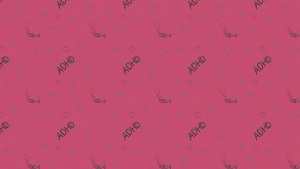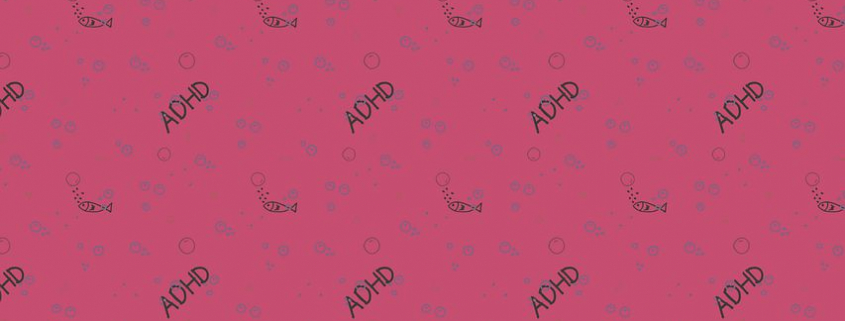How did an Autism Specialist get diagnosed as ADHD?

This is what my brain feels like – lots of bubbles (thoughts, ideas and distractions) going up through my head!
Just to jump right in…The autism specialist is me, Lynn McCann, and I was diagnosed with ADHD in July.
As with most events like this there is a back story. I have been an autism specialist for 16 years now and in that time have studied and researched autism, ADHD, PDA Profile and other conditions. I have listened intently to the experiences of the autistic young people we work with and of autistic adults who work with us and who are my friends.
I started studying ADHD a few years ago when more and more of our pupils were receiving diagnosis of autism and ADHD together. As usual, we wanted to know as much as possible so we could support our pupils and educate teachers to understand their pupils. At the same time, we as a team were also studying autism and girls and developing our understanding of the reasons why autistic girls were being misunderstood, misdiagnosed and in some cases, missed all together. I started to come across articles and testimonies from ADHD girls and women, realising that they too had been missed or misdiagnosed.
It started years ago
In 2017 I went to the ADHD Foundation ADHD conference in Liverpool. It was there that a few light bulb moments happened, and I realised that:
- The ADHD community were promoting the links between ADHD and autism and embracing dual diagnosis so that they could help and support those children who had both diagnosis.
- More and more adults were being diagnosed, contrary to the past belief that children grew out of ADHD, we were beginning to understand that they didn’t. It was just that adults seemed to learn to adapt and manage ADHD differently. Or sometimes they were blamed for their difficulties, developed mental ill health or some dropped out of society or ended up in the criminal justice system…undiagnosed.
- More and more women were being diagnosed as adults.
I loved listening to Rory Bremner’s story of being diagnosed and how ADHD affected his life. As well as being funny, I loved how ADHD contributed to him to be so creative and intelligent. Whilst there I took the opportunity to do a Qb test. This is a computer programme that tests your reactions, focus and attention. I scored in the top 4% of people likely to have ADHD.

And at that ADHD conference I was told off by another professional for fidgeting during the afternoon talk!
I was becoming more and more convinced that I had ADHD and spent some time investigating my own history, doing online questionnaires for both autism and ADHD and putting together my evidence. I knew there had always been aspects of autism that I totally understood because it was my experience also. I have strong hyper-sensitivities which impact on where I go and choices I make and can be very distressing if I can’t escape them. I thrive on routine and have a lot of anxiety around unpredictability. As a child I could be withdrawn and seem very shy. The truth being (and can still be) that I often don’t know what to do or say around others. These days I can come across as confident because I have worked hard to practice and learn what to do and I genuinely love people, so make all the effort I can to listen and to engage with them. I have taught myself to do this for many, many years and hope that people who meet me now can see my genuine interest in them. (And forgive my interrupting, distractions and over-excitement.) I love doing training and presenting because I have a script and intense interest in my subject, and I love explaining things. I can move around and if you have ever seen me do a presentation in real life you will see that I don’t stay still at all.
I understand autism so well because I have family members and close friends who I have helped self-identify or become officially diagnosed, as well as working with so many autistic children all these years. However, I also love novelty and have the boredom threshold of a gnat. (my own phrase there!) I am impulsive and can be distracted at the tiniest thing. It was clues like that, that led me to looking more at ADHD.
There’s obviously a lot more to it… but let’s get back to the story…
Three years ago, I had written a four page essay on why I might have ADHD and took it to my doctors. She agreed to refer me to the assessment team. I knew it would be a couple of years so tried to settle down to wait. After a year I hadn’t heard anything, so I rang my surgery. They were very sorry, they said, they and forgotten to send the referral and did I still want to be referred? (GRRRRR!) So, they did, and a couple of weeks later I was called to an appointment with the mental health team to triage me. Once I told them I wasn’t there for a mental health assessment but a referral for an ADHD assessment, they finally got the right forms out and after our interview, said they would put the referral forward. I know ADHD isn’t a mental health condition, but it can affect (and in my past it has done) mental health. At this time, I was fine and just wanted to get on with the ADHD assessment. (Did I say I was rubbish at waiting for things!)
So, two years and one month later I was contacted by the Lancashire ADHD Assessment Team in Haydock (which isn’t actually in Lancashire but Merseyside) to invite me for a video conference assessment. I filled in more forms and had a good chat to my family about my history, things they noticed and examples from my childhood. I have two good friends who recently had an adult ADHD assessment, and they were both so helpful and encouraging. By this time, I was a nervous wreck. I was fairly convinced that I fit the diagnostic criteria but terrified I might have got it wrong, or the assessor wouldn’t agree with me. I checked out the service and knew that they had up to date knowledge, were diagnosing adults and knew about adult women and ADHD.
After an hour and a half asking me questions about my whole life, going through each aspect of the diagnostic criteria, the assessor said “YES”. He was confident that he could diagnose me with ADHD. That is the point my brain went to mush and I couldn’t focus on anything else for the rest of the day.
What happens next?
According to the NICE guidelines, ADHD can be treated with medication and therapy alongside it. I am not keen on medication at this point, but am signing up for the therapy sessions they are offering and seeing what that might do to help. I am 53 years old (yes, I know you can’t believe it!) and at this time in my life I have a million strategies on the go, and many of them do work. I look like the most uber-organised person on the outside but on closer examination it is all quite tenuously held together. However, I run my own business and have people around me who catch what I drop and who look after me. I have the best team in the world. We are mostly neurodiverse people and fully empathetic to working with differences in people within our team as well as in those we work with.
It is a huge thing to declare my ADHD diagnosis publicly. But in my position I have the opportunity to do some good with it. I can help dispel the misunderstandings about ADHD and encourage those who might be thinking they are ADHD to go for assessment. I have been a teacher for 30 years and I can reflect on how ADHD has affected my teaching and how some reasonable adjustments could have made a huge difference. I am an employer and business leader that can help other employers recognise their own neurodiversity as well as understand and help their employees. I can share my experiences and struggles, my strategies and challenges to help others. I have already written and deliver a course about how autism and ADHD can interact. In the future I will be writing more about adult ADHD and also how to support ADHD girls in school. I will continue with my autism work and developing our team’s expertise so we can be there for our pupils, their families and their teaching staff. We are still autism specialist first.
And I can be a bit kinder to myself. Sometimes I will struggle and there is a reason I can understand. And that is okay.
Finally, I want to thank my family and all those amazing people in the autism and ADHD community who have helped and supported me in this journey. You know who you are. Thank you with all my heart.
Here’s some great websites and organisations I have found useful. I’m sure to be adding to these over time.
https://adhdfoundation.org.uk – Great online information and conferences
https://howtoadhd.com – I love Jessica’s you tube channel too.
https://www.additudemag.com/self-test-adhd-symptoms-women-girls/ – this is what helped me start to collate my evidence. Great magazine on so many issues.
https://www.additudemag.com/rejection-sensitive-dysphoria-and-adhd/ – this article was illuminating for me.

 www.pixabay.com
www.pixabay.com
 LynnMcCann
LynnMcCann  Lynn McCann
Lynn McCann